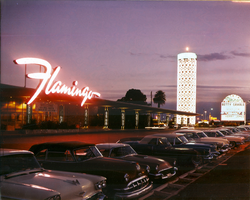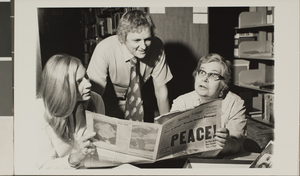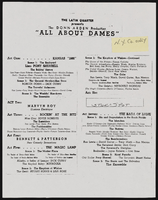Search the Special Collections and Archives Portal
Search Results
Si Zentner Collection of Music Scores
Identifier
Abstract
The Si Zentner Collection of Music Scores consists of copyright agreements and original music scores from the career of musician Si Zentner. The manuscripts span from 1957 through 1996.
Archival Collection
Evelyn Stuckey Papers
Identifier
Abstract
The Evelyn Stuckey Papers date from 1940 to 1972 and document Stuckey's experience as a physical education teacher at Las Vegas High School (LVHS) in Las Vegas, Nevada and founder of the LVHS Rhythmettes dance group. The collection contains personal and educational materials from Stuckey’s college years, personal correspondence, and photographs. It also contains materials documenting the Rhythmettes' activities including travel plans, posters and fliers, news clippings, and group rosters.
Archival Collection
Las Vegas Art League Photograph Collection
Identifier
Abstract
The Las Vegas Art League Photograph Collection contains two photographic prints from between approximately 1960 and 1969. These photographs depict the director of the Las Vegas Art League, Lucile Spire Bruner, along with other individuals viewing and displaying art in Las Vegas, Nevada. Other individuals pictured are Bill Cramer, Miram Kapfer, Irene Chenin, Marge Herzoz, Mary Callahan, and Eleanor Badik.
Archival Collection

Photograph of the Flamingo Hotel at sunset, Las Vegas, circa mid 1950s
Date
Archival Collection
Description
Image

Photograph of individuals at Special Collections, University of Nevada, Las Vegas, September 1975
Date
Archival Collection
Description
From left to right: Susan Jarvis, Hal Erickson, and Alfreda Blood in the Special Collections department at the University of Nevada, Las Vegas (UNLV). They are examining the Leonard T. Blood papers just donated to UNLV Special Collections.
Image
Lawrence Revere Papers
Identifier
Abstract
The Lawrence Revere Papers primarily consist of correspondence between Lawrence Revere and the developers of blackjack betting systems dating from 1965 to 1970. The collection includes information about blackjack gambling systems, correspondence with gambling experts, and press material regarding the publication of Revere's book
Archival Collection
First Good Shepherd Lutheran Church Photograph Collection
Identifier
Abstract
The First Good Shepherd Lutheran Church Photograph Collection, approximately 1930 to 1950, consists of black-and-white photographic prints and negatives depicting the construction of the Good Shepherd Lutheran Church in Las Vegas, Nevada. Also included are images of parish leaders and the ground breaking ceremony for the grand opening.
Archival Collection
Paul J. Richert Photograph Collection
Identifier
Abstract
The Paul J. Richert Photograph Collection (approximately 1950-1951) consists of black-and-white photographic prints and negatives depicting the swimming pools at the Desert Inn and Flamingo Hotel & Casino in Las Vegas, Nevada. Also included is an image of the Las Vegas High School Rhythmettes dance group and an image of the El Rancho Hotel and Casino in Las Vegas.
Archival Collection
Nadine Tobin Collection of Helldorado Photographs
Identifier
Abstract
The Nadine Tobin Collection of Helldorado Photographs, approximately 1940 to 1959, contains black-and-white photographic prints depicting parade floats during Helldorado Days celebrations in Las Vegas, Nevada. Also included is one image of a primary school class in Las Vegas.
Archival Collection

